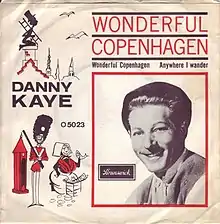Wonderful Copenhagen
"Wonderful Copenhagen" is a song and single written by Frank Loesser performed by Danny Kaye with Gordon Jenkins and his orchestra and released in 1953.
| "Wonderful Copenhagen" | |
|---|---|
 | |
| Single by Danny Kaye | |
| B-side | "Anywhere I Wander" |
| Released | 1953 |
| Genre | Film, waltz[1] |
| Label | Brunswick |
| Songwriter(s) | Frank Loesser |
It was taken from the 1952 film, Hans Christian Andersen and is considered to be the best known song in the film. It occurs in the film where Andersen, played by Kaye, is about to be expelled from Odense and his apprentice Peter advocates going to Copenhagen. [2]
The single made number 5 in the UK Singles Charts in 1953 staying in the charts for 10 weeks.[3][4]
Legacy
Loesser had never visited the city when he wrote the song. The Danish people took to the song and Loesser was greeted as a national hero when he later visited the country. [5]
The song was used by the local tourist organisation but was not a hit in Denmark due to Kaye’s pronunciation of "Copenhagen" making the word sound German and not as in Danish. [lower-alpha 1] (Danish: København [kʰøpm̩ˈhɑwˀn] (![]() listen) [7]
listen) [7]
References
- Steven Suskin (9 March 2010). Show Tunes: The Songs, Shows, and Careers of Broadway's Major Composers. Oxford University Press. pp. 819–. ISBN 978-0-19-988615-9.
- Philip Furia; Laurie Patterson (7 April 2010). The Songs of Hollywood. Oxford University Press. pp. 214–. ISBN 978-0-19-979266-5.
- "DANNY KAYE | full Official Chart History | Official Charts Company". www.officialcharts.com.
- Paul Gambaccini; Jo Rice (July 1991). British Hit Singles: Every Single Hit Since 1952. Random House Incorporated. ISBN 978-0-8230-7572-0.
- Susan Loesser (2000). A Most Remarkable Fella: Frank Loesser and the Guys and Dolls in His Life : a Portrait by His Daughter. Hal Leonard Corporation. pp. 127–. ISBN 978-0-634-00927-3.
- "Copenhagen". Random House Webster's Unabridged Dictionary.
- Eckhart Oehlens (2 June 2020). Copenhagen Differently: The alternative guidebook. BoD – Books on Demand. pp. 77–. ISBN 978-87-430-1590-1.
Footnotes
- Pronounced /ˌkoʊpənˈheɪɡən, -ˈhɑː-/ KOH-pən-HAY-gən, -HAH- or /ˈkoʊpənheɪɡən, -hɑː-/ KOH-pən-hay-gən, -hah-.[6]
